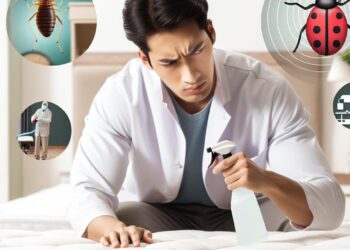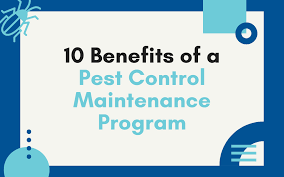Bed bugs, pesky pesticides, and buzzing bees in your household can be a real nuisance, right? They disrupt your comfort, may cause health issues, and even affect your business if left unchecked. You might think that these are just minor problems, but they can escalate quickly if not controlled. Getting rid of these pests doesn’t always mean harsh chemicals; there are natural home remedies that can effectively tackle them. This blog’s your go-to guide for understanding why pest control is important, the common issues you might face, and practical solutions to keep your home safe and pest-free. Let’s dive in and take back control!
Understanding ‘Home Remedies to Combat Pests Effectively’
When it comes to dealing with pests like bedbugs and bees, understanding their nature is a good starting point. Bedbugs are tiny, wingless insects often associated with unclean environments, but they’re actually quite indiscriminate and can hitch a ride from just about anywhere. You’ll often find them in places where humans nestle, such as mattresses, bed frames, and even in sofa seams. They’re known for their pesky bites, which can leave you with itchy welts. Being nocturnal, they usually come out to feed when you’re asleep. Looking for signs of infestation? You might spot red or rust-colored stains on your bedding, fecal spots, or, worse still, live bugs scuttling about.Bees, on the other hand, are more than just your resident pollinators; they can turn into unwelcome guests if they decide to build a hive in your garden shed or attic. Keep an eye out for unusual buzzing, increased bee activity, or honey accumulating in unwanted areas.
Potential Challenges with Home Remedies for Bed Bugs and Bees
- Structural Damage: Attempting to eliminate pests with homemade remedies can sometimes cause more harm than good. Misuse of certain substances might weaken your home’s structure or damage the interiors. For instance, excessive use of vinegar or baking soda can deteriorate surfaces over time.
- Health Risks: Some DIY pest control methods, like certain essential oils or spices, can trigger allergies or skin irritation. It’s crucial to understand any potential risks before using them, especially if you’ve got kids or pets around.
- Food Contamination: Using kitchen ingredients to curb pests can lead to unintentional food contamination. Imagine sprinkling cinnamon to deter ants; while it’s effective, it might also end up in your breakfast cereal! So, be cautious with these food-based remedies.
- Property Devaluation: Persistent pest issues, if left unchecked or improperly managed, can lead to a decline in property value. A home infested with pests is not only uncomfortable to live in but also less appealing to potential buyers.
- Damage to Pets and Gardens: Some home remedies could be harmful to your furry friends or your lovely garden. Ingredients like garlic and some essential oils are potentially toxic to pets. Moreover, spraying vinegar and some other substances might negatively affect your garden plants.
- Ineffectiveness against Severe Infestation: Home remedies often aren’t equipped to deal with severe infestations. Relying solely on them might allow the problem to grow, leading to more significant damage and costlier solutions down the line.
Effective Natural Solutions for Eliminating Bed Bugs and Bees
- Essential Oils: Essential oils like lavender, eucalyptus, and peppermint not only smell great but also work wonders as natural repellents. Mix a few drops in water and spray around the home’s infested areas. Their strong scents are effective in deterring bees and other pests without harming them. This method is perfect for those wanting to keep ecosystems intact while keeping pesky bugs at bay!
- Vinegar: Vinegar isn’t just for chips! Its acidic nature makes it a powerful repellent. Mix equal parts vinegar and water, and spray the solution in places where pests are likely to hide—like crevices and bed joints. It’s particularly good for dealing with ants and bed bugs. You’ll find them scurrying away in no time!
- Herbs: Herbs like basil, mint, and rosemary pack more than just flavour. Plant them around your garden or keep them in pots indoors, and they’ll help ward off pests. The strong aromas confuse insects, making it hard for them to find their way to your home. Plus, as a bonus, you’ve got fresh herbs ready for cooking!
- Natural Predators: Nature can often take care of itself! Introducing natural predators like ladybirds to your garden can help control pest populations. These little guys love to feast on aphids, keeping your plants pest-free. It’s a way of letting nature run its course without intervention.
- DIY Traps: You don’t always need professional solutions to handle pests. DIY traps made from everyday items can be highly effective. For instance, a mixture of apple cider vinegar and soap in a jar can trap fruit flies, while a simple pit trap can handle ground-dwelling insects. Just remember to dispose of the traps responsibly!
Using Chemicals: Effective Tips for Bed Pesticides and Bees.
Are you dealing with the pesky problem of bed bugs and bees? Sometimes, home remedies just don’t cut it. If you find yourself in this situation, exploring chemical treatment options can be a practical step. Here’s a detailed look at some chemical treatments you might consider:- Diatomaceous Earth: This naturally occurring substance works wonders by drying out the bodies of bed bugs upon contact. Simply sprinkle it around your bed and in crevices where bed bugs might hide. Remember to leave it for a few days before vacuuming it up.
- Permethrin: A common insecticide, it targets bed bugs effectively. Apply it directly to infested areas, like mattress seams or bed frames. Ensure good ventilation and avoid direct contact with your skin.
- Boric Acid: While it’s more commonly used for cockroaches, boric acid can also help manage some bee infestations. Place it in powdered form where bees are most active, but take care to avoid areas accessible to children or pets because it’s toxic when ingested.
- Pyrethroids: These synthetic chemicals mimic natural insecticides found in chrysanthemums and are effective against bed bugs and bees. Apply them directly in less trafficked areas, such as under furniture or in attic spaces.
Prevention Tips: Keep Unwanted Pests Out of Your Home
It’s important to stay on top of potential pest problems before they become absolute nightmares. An effective way to ensure your home stays pest-free is by adopting prevention strategies. Here’s a structured list to guide you through:- Proper Waste Disposal and Cleanliness: Keep your home tidy and dispose of rubbish regularly. Pests like rodents and cockroaches are attracted to leftover food and rubbish bins.
- Sealing Entry Points and Cracks: Regularly inspect your home for cracks and holes that might serve as entry points for pests. Use caulk or other appropriate materials to seal them.
- Using Pest Deterrents: Install screens on windows and doors to prevent pests from entering. Consider using natural deterrents like essential oils or herbs, which can be effective and non-toxic.
- Regular Inspections and Maintenance: Schedule regular inspections for signs of pests. Look for droppings, nest materials, or unusual smells. If needed, consult professional pest control services for a thorough check.
- Garden Maintenance: Keep your garden neat and remove any debris, as these can attract pests. Trim trees and bushes to keep them from touching your house, preventing easy access to pests.
- Proper Food Storage: Store food items in airtight containers to keep them safe from pests. Ensure your pantry is clean and free of crumbs.
- Check for Leaks: Fix any leaks promptly, as moisture can attract pests like termites and mould-producing insects.
- Pet Care: If you have pets, make sure their bowls are clean and food is not left out for too long, as this can attract pests like ants or flies.
Debunking Myths about Home Remedies for Pests and Bees
| Myth | Fact |
|---|---|
| Using essential oils can completely eliminate pests like bedbugs and bees. | Essential oils may deter pests temporarily, but they rarely eradicate infestations effectively. Professional treatment is often required. |
| All bedbugs respond to diatomaceous earth, making it a foolproof solution. | Diatomaceous earth can help control bedbugs, but it’s not a standalone solution. It works best as part of a comprehensive pest control strategy. |
| Bees can be easily relocated without any risk by using smoke. | While smoke calms bees, relocating them safely often requires professional expertise to prevent harm to both bees and people. |
| Homemade vinegar solutions can destroy bedbug eggs. | Vinegar can kill visible bedbugs on contact, but it does little against eggs. A thorough approach is needed to tackle all life stages. |
| Lemon juice can deter every kind of pest from invading your home. | Lemon juice may repel some insects due to its acidity, but it’s not a universal remedy for all pests and should be part of a broader plan. |
















